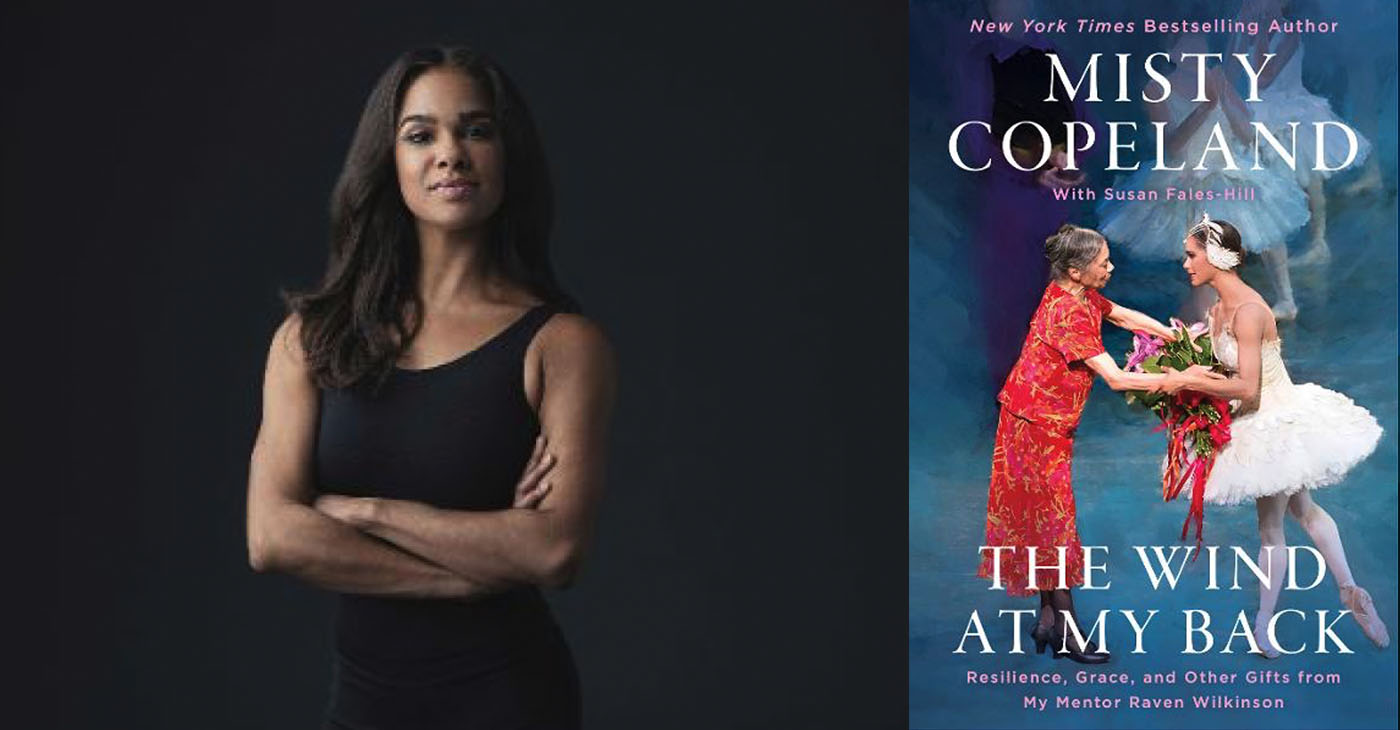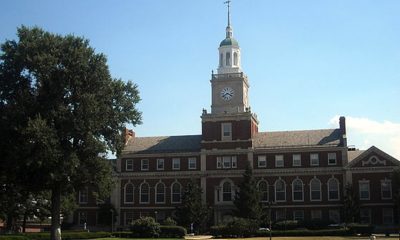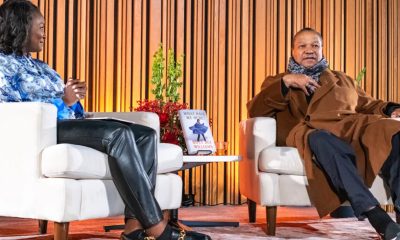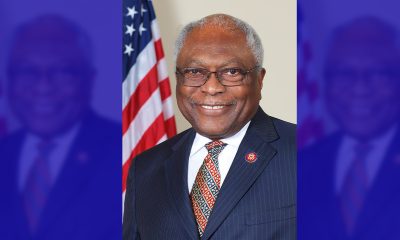Activism
Misty Copeland’s New Memoir “The Wind at My Back” Pays Homage to Another Black Ballerina
Misty Copeland, somewhat of a pathfinder herself, weaves the story of her career in with Raven Wilkinson’s, whose work had been hidden in plain sight for decades. In telling Wilkinson’s story, loudly and publicly, Copeland also writes of the friendship the two women had, and how Wilkinson pushed Copeland to soar to greater heights, career-wise and in Copeland’s personal life. This gives the book an intimate feel, sometimes uncomfortably so, but the sense of gratitude and absolute love for a woman who didn’t hear the word “no” when society repeated it overpowers any squirm you might feel.

You don’t belong here.
It’s a declaration that seems confusing, at first. Who says? Who’s in charge here? You don’t belong because…why? The answer is almost always as rude and hurtful as the statement itself, almost as unthinkable now as it was 70 years ago. But in “The Wind at My Back: Resilience, Grace, and Other Gifts from My Mentor, Raven Wilkinson” by Misty Copeland with Susan Fales-Hill, those are four words that strengthen resolve.
Copeland’s first memoir, “Life in Motion: An Unlikely Ballerina,” was published in 2014, before her unprecedented 2015 promotion making her the first African American Principal Female Dancer in the American Ballet Theater’s 75-year history.
Her career at ABT started in the ballet corps in 2001, later becoming a soloist in 2007 when she was quite often the only Black dancer on the stage. She got used to it, but never got comfortable with it. Racism is common in dance and most Black dancers in American history were encouraged to stick with “modern” performances.
That wasn’t the kind of dance Copeland had always dreamed of.
Still, she persevered. Just being with the ABT kept her in place for what the future might bring and besides, she felt like she was representing. Her presence there was encouraging to Black girls who were told they’d never be ballerinas.
And then Copeland met Raven Wilkinson, one of several women of color who paved the way in dance.
Wilkinson (1935-2018) was born to educated, upper-crust Black parents and had set her sights on ballet when she was 5 years old, having experienced the Ballet Russe de Monte Carlo. She cried then at the emotion in the ballet, and she knew that she wanted to dance. Her parents enrolled her in the School of American Ballet and later, she was trained by Madame Swoboda, one of the Bolshoi Theatre’s premiere ballerinas.
On the cusp of realizing her dream, however, Wilkinson was told that it was “never going to happen” because she was “colored.”
And yet, she, too, persevered and she began touring with a professional troupe which took her to the American South where she fought for her dignity, and she endured threats on her life. Still, she danced, a pioneer, a professional, and a “first.” And when she met Copeland, she became a supportive, loving, wise, thoughtful, powerful mentor.
While it sure looks like a book and it feels like a book, “The Wind at My Back” isn’t really a book. No, it’s a love letter to an elder trailblazer with grace, both inside and out.
Copeland, somewhat of a pathfinder herself, weaves the story of her career in with Wilkinson’s, whose work had been hidden in plain sight for decades. In telling Wilkinson’s story, loudly and publicly, Copeland also writes of the friendship the two women had, and how Wilkinson pushed Copeland to soar to greater heights, career-wise and in Copeland’s personal life. This gives the book an intimate feel, sometimes uncomfortably so, but the sense of gratitude and absolute love for a woman who didn’t hear the word “no” when society repeated it overpowers any squirm you might feel.
A working knowledge of ballet will enhance your enjoyment of this book, but it’s not an absolute necessity. If you (or your teen!) merely love a good double-biography, “The Wind at My Back” belongs on your bookshelf.
“The Wind at My Back” by Misty Copeland with Susan Fales-Hill, c.2022, Grand Central Publishing, $29.00, 240 pages
Activism
Oakland Post: Week of April 17 – 23, 2024
The printed Weekly Edition of the Oakland Post: Week of April 17 – 23, 2024

To enlarge your view of this issue, use the slider, magnifying glass icon or full page icon in the lower right corner of the browser window. ![]()
Activism
Oakland Schools Honor Fred Korematsu Day of Civil Liberties
Every Jan. 30, OUSD commemorates the legacy of Fred Korematsu, an Oakland native, a Castlemont High School graduate, and a national symbol of resistance, resilience, and justice. His defiant stand against racial injustice and his unwavering commitment to civil rights continue to inspire the local community and the nation. Tuesday was “Fred Korematsu Day of Civil Liberties and the Constitution” in the state of California and a growing number of states across the country.

By Post Staff
Every Jan. 30, OUSD commemorates the legacy of Fred Korematsu, an Oakland native, a Castlemont High School graduate, and a national symbol of resistance, resilience, and justice.
His defiant stand against racial injustice and his unwavering commitment to civil rights continue to inspire the local community and the nation. Tuesday was “Fred Korematsu Day of Civil Liberties and the Constitution” in the state of California and a growing number of states across the country.
One OUSD school is named in his honor: Fred T. Korematsu Discovery Academy (KDA) elementary in East Oakland.
Several years ago, founding KDA Principal Charles Wilson, in a video interview with anti-hate organization “Not In Our Town,” said, “We chose the name Fred Korematsu because we really felt like the attributes that he showed in his work are things that the children need to learn … that common people can stand up and make differences in a large number of people’s lives.”
Fred Korematsu was born in Oakland on Jan. 30, 1919. His parents ran a floral nursery business, and his upbringing in Oakland shaped his worldview. His belief in the importance of standing up for your rights and the rights of others, regardless of race or background, was the foundation for his activism against racial prejudice and for the rights of Japanese Americans during World War II.
At the start of the war, Korematsu was turned away from enlisting in the National Guard and the Coast Guard because of his race. He trained as a welder, working at the docks in Oakland, but was fired after the bombing of Pearl Harbor in 1941. Fear and prejudice led to federal Executive Order 9066, which forced more than 120,000 Japanese Americans out of their homes and neighborhoods and into remote internment camps.
The 23-year-old Korematsu resisted the order. He underwent cosmetic surgery and assumed a false identity, choosing freedom over unjust imprisonment. His later arrest and conviction sparked a legal battle that would challenge the foundation of civil liberties in America.
Korematsu’s fight culminated in the Supreme Court’s initial ruling against him in 1944. He spent years in a Utah internment camp with his family, followed by time living in Salt Lake City where he was dogged by racism.
In 1976, President Gerald Ford overturned Executive Order 9066. Seven years later, the 9th Circuit Court of Appeals in San Francisco vacated Korematsu’s conviction. He said in court, “I would like to see the government admit that they were wrong and do something about it so this will never happen again to any American citizen of any race, creed, or color.”
Korematsu’s dedication and determination established him as a national icon of civil rights and social justice. He advocated for justice with Rosa Parks. In 1998, President Bill Clinton gave him the Presidential Medal of Freedom saying, “In the long history of our country’s constant search for justice, some names of ordinary citizens stand for millions of souls … To that distinguished list, today we add the name of Fred Korematsu.”
After Sept. 11, 2001, Korematsu spoke out against hatred and discrimination, saying what happened to Japanese Americans should not happen to people of Middle Eastern descent.
Korematsu’s roots in Oakland and his education in OUSD are a source of great pride for the city, according to the school district. His most famous quote, which is on the Korematsu elementary school mural, is as relevant now as ever, “If you have the feeling that something is wrong, don’t be afraid to speak up.”
Activism
WOMEN IMPACTING THE CHURCH AND COMMUNITY
Juanita Matthews, better known as “Sister Teacher,” is a walking Bible scholar. She moved to California from the great state of Arkansas in 1971. Sister Teacher has a passion for teaching. She has been a member of Bible Fellowship Missionary Baptist Church since 1971.

Sister Juanita Matthews
55 Years with Oakland Public School District
The Teacher, Mother, Community Outreach Champion, And Child of God
Juanita Matthews, better known as “Sister Teacher,” is a walking Bible scholar. She moved to California from the great state of Arkansas in 1971. Sister Teacher has a passion for teaching. She has been a member of Bible Fellowship Missionary Baptist Church since 1971. She followed her passion for teaching, and in 1977 became the lead teacher for Adult Class #6. Her motto still today is “Once My Student, Always My Student”.
Beyond her remarkable love for the Lord, Sister Teacher has showcased her love for teaching by working for the Oakland Unified School District for 55 years, all but four of those years spent at Emerson Elementary and Child Development School. She truly cares about her students, making sure they have the tools/supplies needed to learn either at OUSD or Bible Fellowship Missionary Baptist Church.
She’s also had a “Clothes Closet Ministry” for 51 years, making sure her students have sufficient clothing for school. The Clothes Closet Ministry extends past her students, she has been clothing the community for over 50 years as well. She loves the Lord and is a servant on a mission. She is a loving mother to two beautiful children, Sandra and Andre. This is the impact this woman of God has on her church and the community.
-

 Activism4 weeks ago
Activism4 weeks agoOakland Post: Week of March 27 – April 2, 2024
-

 #NNPA BlackPress4 weeks ago
#NNPA BlackPress4 weeks agoCOMMENTARY: D.C. Crime Bill Fails to Address Root Causes of Violence and Incarceration
-

 #NNPA BlackPress4 weeks ago
#NNPA BlackPress4 weeks agoFrom Raids to Revelations: The Dark Turn in Sean ‘Diddy’ Combs’ Saga
-

 #NNPA BlackPress4 weeks ago
#NNPA BlackPress4 weeks agoMayor, City Council President React to May 31 Closing of Birmingham-Southern College
-

 #NNPA BlackPress4 weeks ago
#NNPA BlackPress4 weeks agoBeloved Actor and Activist Louis Cameron Gossett Jr. Dies at 87
-

 Community1 week ago
Community1 week agoFinancial Assistance Bill for Descendants of Enslaved Persons to Help Them Purchase, Own, or Maintain a Home
-

 Activism3 weeks ago
Activism3 weeks agoOakland Post: Week of April 3 – 6, 2024
-

 Business1 week ago
Business1 week agoV.P. Kamala Harris: Americans With Criminal Records Will Soon Be Eligible for SBA Loans























































